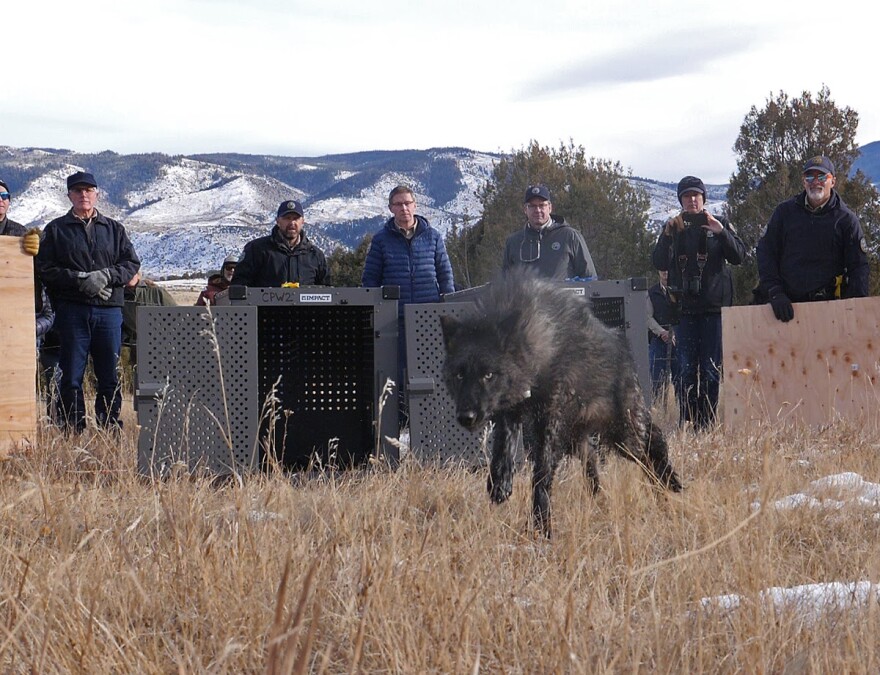Twenty-six organizations signed a petition in September urging the Colorado Parks and Wildlife Commission to delay additional wolf reintroductions until it considers adopting a new article in its code regulations.
Colorado Parks and Wildlife (CPW) announced this week it’s planning to release several wolves in either Garfield, Eagle, or Pitkin County between December 2024 and March 2025. The petitioners’ proposed rule would prevent CPW from reintroducing more wolves on the Western Slope until it can establish several programs that mitigate risks to ranchers.
Tim Ritschard, president of the Middle Park Stockgrowers Association, spoke at a commission meeting Thursday to outline several priority requests in the petition.
First, Ritschard urged CPW to fund and implement a program to deploy range riders in wolf territory. Range riders patrol grazing areas on horseback and act as an obstacle or deterrent to wolves trying to prey on livestock.
Middle Park Stockgrowers received state funding from CPW and the Colorado Department of Agriculture (CDA) in April to implement nonlethal wolf deterrents, including range riders, but Ritschard said they need more resources.
“To date, we have spent $48,000 (on) range riding,” Ritschard said. “We've rode 127 days and hazed the wolf 23 times. This has been one range rider for a territory that has been very large with lots of cattle and sheep in the area.”
CPW’s Deputy Director of Policy Reid DeWalt said Thursday the agency plans to publish a request for proposals in early or mid-December for a range riding program, which could launch as early as Jan. 1 with training programs conducted in February and April.
The state’s new “Born to Be Wild” license plate could fund the range riders. DeWalt expects a fully funded pilot program would cost roughly $500,000 annually and said the license plates yielded about $544,000 as of Nov. 1.
The petition's proposed rule would also require CPW to support ranchers disposing of carcasses after wolf depredation. Some remote parts of Colorado don’t have easy access to a landfill, and Ritschard told commissioners that burying carcasses is difficult in winter when the ground freezes.
Colorado Department of Agriculture’s Wayne East said Thursday that CDA grants are available for livestock associations that want to support ranchers with carcass management, and their staff are investigating how other states are addressing the problem.
“We're continuing to look at best practices from other states and trying to build the best program we can here in Colorado,” East said.
A more cumbersome component of the petitioner’s request — Ritschard said CPW and its partners should conduct site assessments for “every potential impact site” in Colorado.
CPW offers free site assessments to agricultural producers upon request to determine which nonlethal deterrents are best suited for their operations. East said CPW and CDA are leading training sessions on nonlethal wolf management across the Western Slope, encouraging several producers to sign up for assessments.
Opposition from environmentalists
Twenty-seven livestock have been killed or injured by wolves in Colorado since the carnivores were reintroduced in December 2023, according to CPW’s confirmed depredation totals.
Petitioners argue that CPW needs more time to develop programs to prevent these attacks and support affected ranchers before the agency reintroduces more wolves to the landscape.
But environmental organizations protested a potential delay in wolf reintroductions at Thursday’s meeting.
Katie Schneider, Colorado wolf representative for the conservation nonprofit Defenders of Wildlife, raised flags about suspending further wolf reintroductions on Thursday. She said the decision could negatively impact the health of future wolf packs in Colorado.
“To stop now with only nine individuals, including a lone pup, some sibling pairs and a breeding male of the North Park pack, who is old and unlikely to breed again, will create a much bigger genetic problem later.”
Colorado voters approved Proposition 114 in 2020, which mandated CPW reintroduce wolves before Jan. 1, 2024. Middle Park Stockgrowers Association’s Ritschard said the agency fulfilled its obligation and is not required to introduce additional wolves on a specific timeline.
However, former CPW commissioner Gary Skiba, who also serves as a board member of Rocky Mountain Wolf Project, reminded the board of its responsibility to support a productive wolf population in Colorado.
“One of the primary responsibilities that the agency has, or the mandate that it has, is to establish a self-sustaining population of wolves.”
CPW staff outlined their next steps after Ritschard’s presentation. The agency must review the petition, after which they will develop a recommendation to commissioners with support from the attorney general’s office.
CPW did not estimate how long its review process would take.



